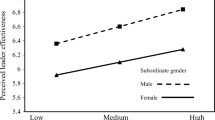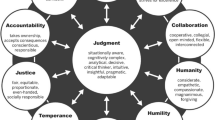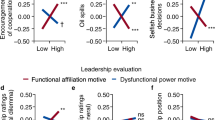Abstract
The aim of the present study was to test the gender-role congruency hypothesis in the context of assumed leadership. Three hundred and forty-two female and 154 male Dutch students participated in a laboratory experiment. We expected that gender-role incongruent leaders would be evaluated less favorably than gender-role congruent leaders and that male subjects would devalue the gender-role incongruent leaders to a greater extent than would female subjects. In addition, we were interested in the relative contribution of the effectiveness and likability measures to the devaluation of gender-role incongruent leaders. The gender-role congruency hypothesis was supported by the data from male subjects only, and then only for the effectiveness measures. The results are discussed in the context of two meta-analyses concerning the impact of gender stereotypes on judgments of competence and evaluation of leaders.
Similar content being viewed by others
References
Bartol, K. M., & Butterfield, D. A. (1976). Sex effects in evaluating leaders.Journal of Applied Psychology, 61 446–454.
Butler, D., & Geis, F. L. (1990). Nonverbal affect responses to male and female leaders: Implications for leadership evaluations.Journal of Personality and Social Psychology, 58 48–59.
Cohen, J. (1969).Statistical power analysis for the behavioral sciences. New York: Academic Press.
Costrich, N., Feinstein, J., Kidder, L., Marecek, J., & Pascale, L. (1975). When stereotypes hurt: Three studies of penalties for sex-role reversals.Journal of Experimental Social Psychology, 11 520–530.
Eagly, A. H., Makhijani, M. G., & Klonsky, B. G. (1992). Gender and the evaluation of leaders: A meta-analysis.Psychological Bulletin, 111 3–22.
Fiske, S. T., & Kinder, D. R. (1981). Involvement, expertise and schema use: Evidence from political cognition. In N. Cantor & J. Kihlstrom (Eds.),Personality, cognition and social interaction. Hillsdale, NJ: Erlbaum.
Geis, F. L., Brown, V., Jennings, J., & Corrado-Taylor, D. (1984). Sex vs. status in sex-associated stereotypes.Sex Roles, 11 771–785.
Hoffman, C., & Hurst, N. (1990). Gender stereotypes: Perception or rationalization?Journal of Personality and Social Psychology, 58 197–208.
Hosking, D. M., & Morley, I. E. (1991).A social psychology of organizing: People, processes and contexts. New York: Harvester-Wheatsheaf.
Korabik, K., & Ayman, R. (1989). Should women managers have to act like men?Journal of Management Development, 8 23–32.
Nieva, V., & Gutek, B. (1981).Women and work. New York: Praeger.
Rice, R. W., Instone, D., & Adams, J. (1984). Leader sex, leader success, and leadership process: Two field studies.Journal of Applied Psychology, 69 12–31.
Schein, E. H. (1991).Organizational culture and leadership. San Francisco: Jossey-Bass Publishers.
Schein, V. E. (1973). The relationship between sex role stereotypes and requisite management characteristics.Journal of Applied Psychology, 57 95–100.
Schein, V. E. (1975). Relationships between sex role stereotypes and requisite management characteristics among female managers.Journal of Applied Psychology, 60 340–344.
Schein, V. E., Mueller, R., & Jacobson, C. (1989). The relationship between sex role stereotypes and requisite management characteristics among college students.Sex Roles, 20 103–110.
Sims, H. P. Jr., & Lorenzi, P. (1992).The new leadership paradigm: Social learning and cognition in organizations. Newbury Park: Sage.
Swim, J., Borgida, E., Maruyama, G., & Myers, D. G. (1989). Joan McKay versus John McKay: Do gender stereotypes bias evaluations?Psychological Bulletin, 105 409–429.
Ward, C. (1981). Prejudice against women: Who, when, and why?Sex Roles, 7 163–171.
Author information
Authors and Affiliations
Rights and permissions
About this article
Cite this article
Rojahn, K., Willemsen, T.M. The evaluation of effectiveness and likability of gender-role congruent and gender-role incongruent leaders. Sex Roles 30, 109–119 (1994). https://doi.org/10.1007/BF01420743
Issue Date:
DOI: https://doi.org/10.1007/BF01420743




